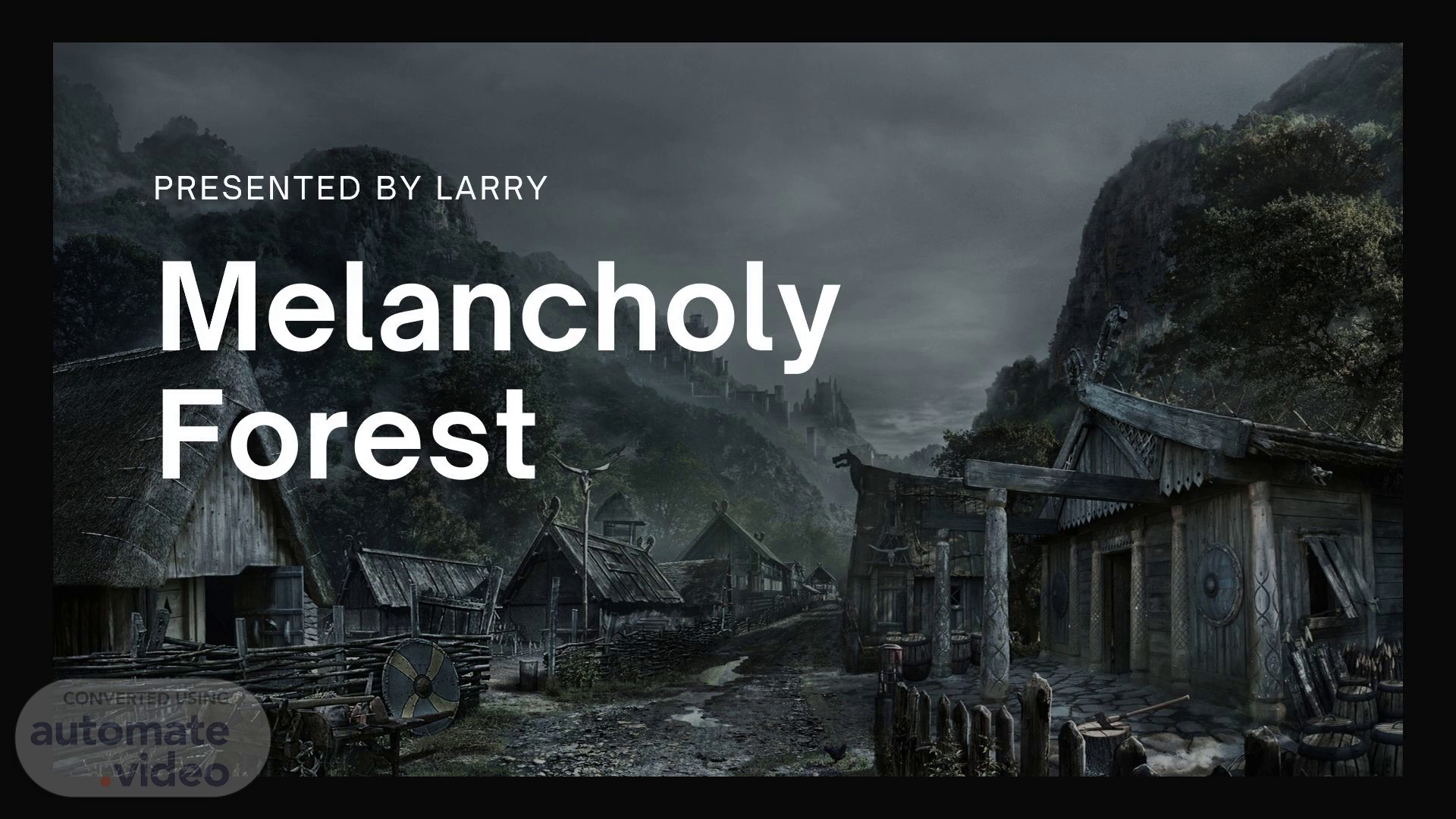
Melancholy of the Forest
Scene 1 (0s)
Melancholy of the Forest. PRESENTED BY LARRY.
Scene 2 (7s)
PRESENTATION INCLUDE.... SUMMARY. SETTING FEATURE.
Scene 3 (20s)
Summary.
Scene 4 (25s)
Story depicts a young woman who had been abandoned as a baby by her village because she was born from an outsider. The inhabitants of the village, were afraid of a mix in their bloodline. So, the baby girl was left all by herself to be raised by the spirits of the forest. Years later, the girl returns to the village and sees that not much has changed and the people are still just as simple-minded as before. One particular young man from the village quickly becomes obsessed with her but when she eventually leaves, he feels the profound impact of her departure. In the end, the author emphasizes the man’s emptiness and his unfulfilled human desire as the spirits of the forest watch on in intrigue as they always do. His curiosity eventually causes him to leave his home, and he is never the same again..
Scene 5 (1m 5s)
Setting Feature.
Scene 6 (1m 11s)
Spirits of the forest Author uses personification to emphasize the caregiver relationship between the spirits of the forest and protagonist Spirits of the forest are a metaphor of a parent: “raised me”, “saved me”, “expected me to be” “Showed little compassion, despised boredom and had grown tired of the village” (p.2, para. 6) “They fed me strange fruits, put me down on a bed of moss and first taught me the words of the wind.” (p.2, para. 7).
Scene 7 (1m 36s)
Spirits of the forest The spirits of the forest want the protagonist to exist for their enjoyment "...show us a performance even more amazing than the last" (p.3, para.14) The protagonist turned out to have a twisted soul “...having been raised without human sensitivity.” (p.2, para.8) “I was missing emotion and my soul had turned black.” (p.2, para.8) “They loved me, especially my twisted soul.” (p.2 para.8).
Scene 8 (2m 1s)
Author’s Tone.
Scene 9 (2m 6s)
Setting Feature. Melancholic First person major “Abandoned” as emotive language (p. 1, para. 1) “They pretended like I never happened” (p.2, para. 5) Imagery: “The glimmering stars high above looked like the spirit of the baby, as if I had already risen to the heavens.”(p. 2, para. 5) Detached Third person objective “the young lady with the dreamy voice was also gone.“ (p. 4, para. 21) “She was motioning to him. He was so happy.”(p. 5, para. 24).
Scene 10 (2m 32s)
Overall Mood.
Scene 11 (2m 38s)
Overall Mood. Suspicious “The spirits of the forest expected me to be like those travelers” (p.2, para. 8) “She disappeared, as if carried away by the wind, and no one seemed to notice.” (p.5, para.22) A metaphor indicating that protagonist left so quickly “became a part of the past and gradually turned into a doll with a lingering look on its face.” (p.7, para.33) “And the dolls of the forest were laughing happily.” (p.7, para.35) Symbolism: Dolls symbolize people of the village who are manipulated by the spirits of the forest.
Scene 12 (3m 6s)
Theme of the Story.
Scene 13 (3m 13s)
Theme. Isolation and Rejection "Far, far away from the hustle and the bustle of the city, in a valley deep in the mountains..." (p.1, para.1) evokes feeling of isolation The protagonist's abandonment symbolizes the rejection she faces "The spirits of the forest showed little compassion, despised boredom, and had grown tired of the village..." (p.2, para.6) represents nature / outside force, emphasizing the rejection and isolation experienced by protagonist "Till the fields. Shepherd the sheep. Sleep. Catch fish. Sleep..." (p.6, para.29) repetitive daily life in the village being a closed-off community.
Scene 14 (3m 43s)
Lesson Learned.
Scene 15 (3m 49s)
Lesson Learned. Nurture vs. Nature : many human qualities are not gained naturally, instead were received by how people are nurtured and raised. “However, they raised me much differently than a human would have.” (p.2, para.7) “A part of me had been twisted, having been raised without human sensitivity.” (p.2, para.8) Imagery: “I was missing emotion and my soul had turned black.” (p.2, para.8) “Because I was only human when I was born. I haven’t been since.” (p.4, para.16).
Scene 16 (4m 17s)
Thank You For Listening.